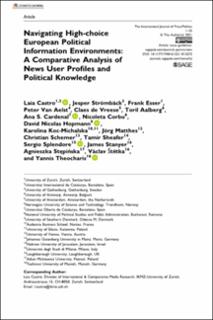| dc.contributor.author | Castro, Laia | |
| dc.contributor.author | Strömbäck, Jesper | |
| dc.contributor.author | Esser, Frank | |
| dc.contributor.author | van Aelst, Peter | |
| dc.contributor.author | de Vreese, Claes | |
| dc.contributor.author | Aalberg, Toril | |
| dc.contributor.author | Cardenal, Ana S | |
| dc.contributor.author | Corbu, Nicoleta | |
| dc.contributor.author | Hopmann, David Nicolas | |
| dc.contributor.author | Koc-Michalska, Karolina | |
| dc.contributor.author | Matthes, Jörg | |
| dc.contributor.author | Schemer, Christian | |
| dc.contributor.author | Sheafer, Tamir | |
| dc.contributor.author | Splendore, Sergio | |
| dc.contributor.author | Stanyer, James | |
| dc.contributor.author | Stepinska, Agnieszka | |
| dc.contributor.author | Stetka, Vaclav | |
| dc.contributor.author | Theocharis, Yannis | |
| dc.date.accessioned | 2022-03-04T08:49:12Z | |
| dc.date.available | 2022-03-04T08:49:12Z | |
| dc.date.created | 2021-08-02T14:04:38Z | |
| dc.date.issued | 2021 | |
| dc.identifier.citation | The International Journal of Press/Politics. 2021, . | en_US |
| dc.identifier.issn | 1940-1612 | |
| dc.identifier.uri | https://hdl.handle.net/11250/2982997 | |
| dc.description.abstract | The transition from low- to high-choice media environments has had far-reaching implications for citizens’ media use and its relationship with political knowledge. However, there is still a lack of comparative research on how citizens combine the usage of different media and how that is related to political knowledge. To fill this void, we use a unique cross-national survey about the online and offline media use habits of more than 28,000 individuals in 17 European countries. Our aim is to (i) profile different types of news consumers and (ii) understand how each user profile is linked to political knowledge acquisition. Our results show that five user profiles – news minimalists, social media news users, traditionalists, online news seekers, and hyper news consumers – can be identified, although the prevalence of these profiles varies across countries. Findings further show that both traditional and online-based news diets are correlated with higher political knowledge. However, online-based news use is more widespread in Southern Europe, where it is associated with lower levels of political knowledge than in Northern Europe. By focusing on news audiences, this study provides a comprehensive and fine-grained analysis of how contemporary European political information environments perform and contribute to an informed citizenry. | en_US |
| dc.language.iso | eng | en_US |
| dc.publisher | SAGE Publications | en_US |
| dc.rights | Navngivelse 4.0 Internasjonal | * |
| dc.rights.uri | http://creativecommons.org/licenses/by/4.0/deed.no | * |
| dc.title | Navigating High-choice European Political Information Environments: A Comparative Analysis of News User Profiles and Political Knowledge | en_US |
| dc.type | Peer reviewed | en_US |
| dc.type | Journal article | en_US |
| dc.description.version | publishedVersion | en_US |
| dc.source.pagenumber | 33 | en_US |
| dc.source.journal | The International Journal of Press/Politics | en_US |
| dc.identifier.doi | 10.1177/19401612211012572 | |
| dc.identifier.cristin | 1923452 | |
| cristin.ispublished | true | |
| cristin.fulltext | original | |
| cristin.qualitycode | 2 | |

